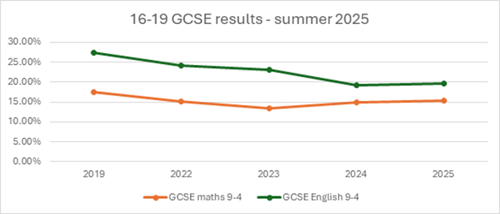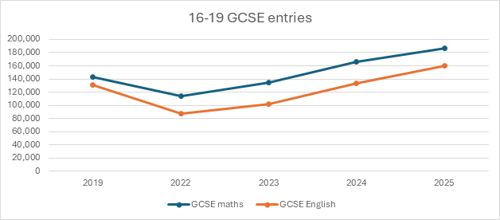Understanding today's GCSE data
Paul Stannard
16 to 19 Senior Policy Manager, AELP
Executive Summary
For many, sitting a GCSE exam for the second, third or even fourth time is no small task. In FE providers across the country dedicated teachers and support staff have worked to support learners to develop their knowledge and confidence to re-sit GCSE examinations. Learners have worked hard to fill knowledge gaps and make progress towards achieving a grade 4 or above. Well done to all teachers, support staff and learners, we hope that all your efforts have paid off as you receive your results today.
We know, English and maths remain critical qualifications for young people and adults to progress into sustainable employment, apprenticeships, and higher education. Despite continued investment, many are still leaving post-16 education without achieving a Level 2 standard.
AELP members consistently highlight a number of challenges:
- Policy rigidity, particularly the compulsory GCSE resit requirement, which often demotivates learners and is not working for those furthest from a grade 4 or above.
- Resource pressures, including the introduction of 100hrs of tuition from the 2025/26 academic year.
- Workforce shortages, with providers struggling to recruit and retain specialist English and maths teachers.
With bold and targeted policy reform there is a clear opportunity to improve outcomes, close attainment gaps, and better align provision with labour market needs and the skills that employers consistently define as needed.
1. Introduction
English and maths outcomes for post-16 learners remain a persistent concern across the skills system. National statistics continue to show that nearly half of 16–19-year-olds entering further education without a grade 4 in English and/or maths do not achieve this by age 19. Functional Skills qualifications, while valued by employers and learners, have also seen fluctuating achievement rates since their reform in 2019.
For training providers, these challenges are compounded by funding constraints, teacher recruitment difficulties, and the ongoing need to motivate learners who have previously experienced repeated failure in these subjects. For many providers there is also the added complication of non-traditional start dates, which cause added pressures in terms of tuition and examinations. Employers regularly report that gaps in literacy and numeracy limit workforce readiness, particularly in entry-level roles and apprenticeships.
This short report sets out the current landscape for post-16 English and maths delivery, examines learner outcomes and suggest a shift in policy to allow AELP members to deliver the much-needed skills and qualifications needed to power the industrial strategy and go some way to meet employer demands.
2. Policy Landscape
The policy environment for post-16 English and maths has remained fairly consistent since the introduction of the condition of funding; however, now is time for a bold shift to ensure that providers can meet the demands of employers and provide young people with the literacy and numeracy skills needed.
Why does policy need to change?
- GCSE condition of funding Policy: Learners aged 16–18 who do not achieve a grade 4 or above in English and/or maths GCSE are required to continue studying the subject. While this policy is intended to raise attainment, providers and learners often question its effectiveness, with many young people facing repeated failure and disengagement.
- There must be a policy shift: The current policy doesn’t mandate that a young person should be entered for an exam in each year of study however, level 2 study programmes are traditionally one year in length and a providers QAR statistics would be negatively impacted if, as according to policy, learners are entered when they are best prepared to achieve.
- Policy changes for 2025/26: Whilst the uplift in funding for English and maths is welcomed a further review of funding rates is required with the policy directive to deliver 100hrs of tuition from August 2025. With continued workforce shortages providers are having to make difficult budgetary decisions when curriculum planning which could lead to further shortages in some localities.
- Ofsted and Skills for Growth: Ofsted continues to place strong emphasis on English and maths delivery within its inspection framework. Meanwhile, government skills strategies (including the Growth and Skills Levy proposals) highlight the importance of literacy and numeracy as foundation skills for employability and progression.
Looking ahead, upcoming reforms to post-16 qualifications and the broader skills system will create both opportunities and risks for English and maths delivery. AELP will continue to advocate for policies that prioritise learner engagement, provider flexibility, and recognition of alternative pathways to success.
3. Headlines – summer 2025 results
Overall, 2024/25 achievement rates for both English Language and maths remain consistent when compared to the full year 2023/24 data. Young people (16-19) year old achievement remains in line with 2024/25. However, with only 19.7% achieving a grade 4 or above in English language and 15.3% achieving a grade 4 or above in maths, too many young people are still exiting post-16 education without a grade 4 or above at GCSE.

Interesting to note from this year's data is the continued increase in GCSE entries for young people. Statistics released today confirm that entries from young people aged 17 and over for GCSE language and maths combined are up 12.1% to 482,402 compared with 430,377 in 2024. In 2025, young people aged 17 and over represent 7.8% of all entries compared with 7.0% in 2024. Further analysis highlights that entries for 16-19 year olds are up by 12.7% in maths and 19.6% in English language respectively.

Given the predicted population bulge making its way through the post-16 sector over the next few years, this continued increase in numbers will only serve to compound the issues that providers are currently facing. This is why AELP is calling for a bold change in the condition of funding to provide young people with the opportunity to build the vital skills required by employers and the future workforce.
4. Call to action: Let’s be brave
Has the English and maths condition of funding has served its purpose? It’s time to ditch the one-size-fits-all model and build a literacy and numeracy programme that truly works for all young people.
We call on:
- DfE and Skills England to be bold when making decision and changes to post 16 literacy and numeracy policy
- The Curriculum Assessment review to prompt policy makers to review the current policy
Understanding today's GCSE data
For any questions, please contact Paul Stannard, 16 to 19 Senior Policy Manager, [email protected]

